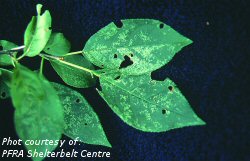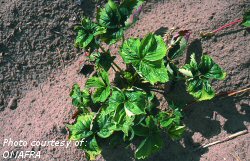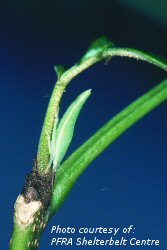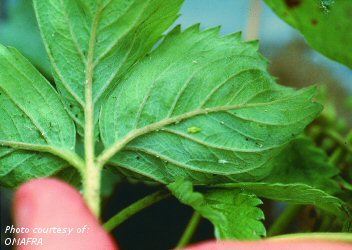Leafhopper

Leafhopper damage

Leafhopper damage to strawberry

Leafhopper adult

Leafhopper nymphs on strawberry
Host Plants And Distribution
Various species of leafhoppers may be found on different host crops including chokecherry, saskatoon, raspberry and strawberry. They are found in all geographical regions.
Biology
Leafhoppers are present from late May through to early October. Leafhoppers are small wedge-shaped insects; 3-5 mm in length, and their colour varies from white to pale green to yellow to black. Most have a single generation per year and many of the species found in Canada do not overwinter here but migrate in on wind currents from the United States. Some species have many generations per year. They are very active insects and fly or jump when disturbed. Feeding is done on the underside of leaves by piercing the plant tissue and sucking out juices.
Symptoms And Damage
Type of damage often depends on the species causing the damage. Leafhoppers are seldom a cause for concern in saskatoon and strawberry. The rose leafhopper is often quite abundant in raspberry and causes leaves to have a mottled or whitish appearance, usually in July. Heavy infestations will reduce yield and fruit size. In chokecherry, leafhoppers are a concern as a vector of Western X-disease. Western X-disease is caused by a mycoplasma-like organism that is spread by leafhoppers. It is known in Saskatchewan, North and South Dakota, Wyoming and Minnesota. Symptoms include development of greenish-yellow leaves in late June. In July, leaves turn red and there is usually twig die-back.
Scouting Techniques
Leafhoppers may be monitored using yellow sticky traps. When leafhoppers are abundant, they may be monitored by visually inspecting leaves.
Economic Thresholds
No economic thresholds have been established for leafhoppers on any of the four primary berry crops. Control measures should be undertaken on strawberry and saskatoon only when numbers are very high (>10/plant). Damage in strawberry plantings generally occurs only in year of establishment. In raspberry, control may be warranted, but only when insects are widespread and damage is obvious. Chokecherry is the crop where leafhoppers are the most serious concern because of Western X disease. Good weed control is essential, as it provides cover for the leafhoppers when they are not on the host plant.

